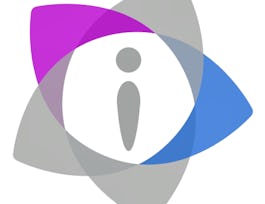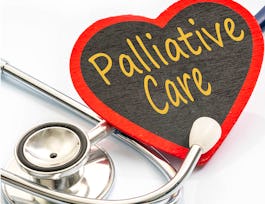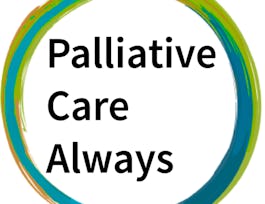Palliative care provides important support for people living with serious or life-limiting illnesses and their family caregivers. In this course, you will learn to use symptom assessment tools to better understand which symptoms are present and which are most distressing. In subsequent weeks you will learn about some of the most common and distressing symptoms such as anorexia (loss of appetite), dyspnea (shortness of breath), fatigue (weakness), delirium(confusion) and constipation and nausea/vomiting. For each of these symptoms, you will learn about the underlying cause and potential ways to support people and their families to manage the symptoms with simple practical and non-medical approaches as well as a review of medications as appropriate. In addition, you will learn to help people with their emotional response to symptoms and loss of function.


Easing Physical Symptoms: It's Not Just Hospice Anymore
This course is part of Palliative Care: It's Not Just Hospice Anymore Specialization
Taught in English
Some content may not be translated



Instructors: Regina Fink
3,471 already enrolled
Included with 
Course
(82 reviews)
Details to know

Add to your LinkedIn profile
6 quizzes
Course
(82 reviews)
See how employees at top companies are mastering in-demand skills

Build your subject-matter expertise
- Learn new concepts from industry experts
- Gain a foundational understanding of a subject or tool
- Develop job-relevant skills with hands-on projects
- Earn a shareable career certificate


Earn a career certificate
Add this credential to your LinkedIn profile, resume, or CV
Share it on social media and in your performance review

There are 5 modules in this course
Welcome! In this module, you will learn about physical symptom assessment and then about the distressing symptoms of anorexia (loss of appetite) and cachexia (extreme weight loss). People living with serious illness often have more than five non-pain symptoms, like loss of appetite, dyspnea, weakness, confusion and many others that are contributing to suffering. You will learn how to use a symptoms assessment tool to help providers understand what symptoms are present and what is most distressing and needs prompt attention. In the second part of this week, you will learn about the common symptom of anorexia: Loss of appetite. When you understand anorexia you are able to look for reversible causes, support patient and family emotional distress, and offer practical help to manage this problem.
What's included
11 videos10 readings1 quiz
In this module, you will review dyspnea assessment basics. You will start with defining dyspnea and the scope of the dyspnea problem in the palliative care setting. You will review various types and causes of dyspnea in people with serious illness. To understand how medications and integrative pain therapies work to decrease dyspnea, you need to know how the body recognizes dyspnea and makes a person short of breath. You will review how to evaluate a person’s dyspnea and how to help people pace themselves so that they can live with shortness of breath.
What's included
5 videos4 readings1 quiz
In this module you learn about the physical symptom of asthenia, also called fatigue. Fatigue and weakness are seen in almost all people living with serious illness. Although fatigue is common and very emotionally distressing, providers often don't talk about it with patients and families because they think that there is nothing they can do. Although fatigue is a difficult symptom to treat it is important to look for reversible causes, consider ways to reduce the distress of fatigue and provide practical help to cope and live well with serious illness.
What's included
8 videos7 readings1 quiz
In this module the learner will be introduced to the term “cognitive impairment”, the common types of this impairment, how these types differ, as well as signs and symptoms experienced by patients suffering with this type of serious illness.
What's included
7 videos4 readings2 quizzes
Nausea, vomiting, and constipation are frequent symptoms among patients with advanced illness. The aim of this lecture is to review how these symptoms occur and how they can be treated from a palliative care perspective.
What's included
5 videos2 readings1 quiz
Instructors


Offered by
Recommended if you're interested in Patient Care

University of Colorado System

University of Colorado System

Stanford University

Stanford University
Why people choose Coursera for their career




Learner reviews
Showing 3 of 82
82 reviews
- 5 stars
89.02%
- 4 stars
7.31%
- 3 stars
3.65%
- 2 stars
0%
- 1 star
0%
New to Patient Care? Start here.

Open new doors with Coursera Plus
Unlimited access to 7,000+ world-class courses, hands-on projects, and job-ready certificate programs - all included in your subscription
Advance your career with an online degree
Earn a degree from world-class universities - 100% online
Join over 3,400 global companies that choose Coursera for Business
Upskill your employees to excel in the digital economy
Frequently asked questions
Access to lectures and assignments depends on your type of enrollment. If you take a course in audit mode, you will be able to see most course materials for free. To access graded assignments and to earn a Certificate, you will need to purchase the Certificate experience, during or after your audit. If you don't see the audit option:
The course may not offer an audit option. You can try a Free Trial instead, or apply for Financial Aid.
The course may offer 'Full Course, No Certificate' instead. This option lets you see all course materials, submit required assessments, and get a final grade. This also means that you will not be able to purchase a Certificate experience.
When you enroll in the course, you get access to all of the courses in the Specialization, and you earn a certificate when you complete the work. Your electronic Certificate will be added to your Accomplishments page - from there, you can print your Certificate or add it to your LinkedIn profile. If you only want to read and view the course content, you can audit the course for free.
If you subscribed, you get a 7-day free trial during which you can cancel at no penalty. After that, we don’t give refunds, but you can cancel your subscription at any time. See our full refund policy.



